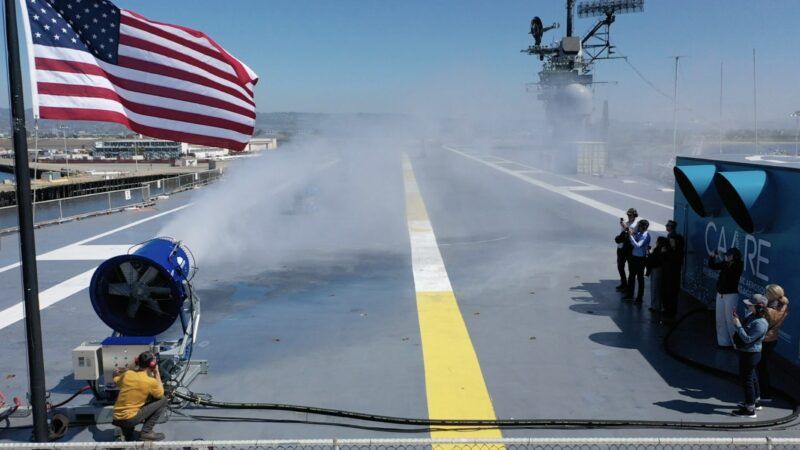Marine Cloud Brightening Geoengineering Experiment Halted
Why do environmentalist ideologues oppose research on a possible emergency backup system to cool the climate?

Atmospheric scientists associated with the University of Washington began a marine cloud brightening experiment in April on the decommissioned aircraft carrier U.S.S. Hornet docked in Alameda, California. They are preliminarily probing whether or not marine cloud brightening could work as a way to cool our warming planet by deflecting sunlight back into space. The basic idea is to mimic the cloud-brightening effects produced by the emissions of sulfur dioxide along the tracks of ocean-going cargo ships. As it happens, stringent fuel regulations adopted in 2020 have significantly cut cargo ship sulfur dioxide emissions, which permits more sunlight to reach the surface. This, somewhat ironically, has resulted in rising temperatures.

Instead of sulfur dioxide, the University of Washington researchers are using specially designed nozzles to spray misted seawater containing tiny particles of sea salt over the deck of the Hornet. Among other things, the experiment aims to see how wind and humidity affect the sprayed particles. If all is well, the researchers would next try spraying the seawater particles higher into low-level offshore stratocumulus clouds. Such clouds cover about 20 percent of the low-latitude oceans and 6.5 percent of the Earth's surface. University of Washington researchers calculate that brightening 15 percent of Earth's marine clouds would cool the planet by roughly one degree Fahrenheit.
But just like with other proposed experiments in solar radiation management as possible emergency backup systems to cool the planet, various environmentalist ideologues oppose this experiment. "This is a scary vision of the future that we should try and avoid at all costs," David Santillo, a senior scientist at Greenpeace International told The New York Times. If solar radiation management techniques work, activists fear that the public and policymakers will slow their preferred policy of mandating a rapid transition from carbon-dioxide-emitting fossil fuels to renewables.
Evidently spooked by prominent media reports, the Alameda City Council has now asked the researchers to halt their experiments. "City staff are working with a team of biological and hazardous materials consultants to independently evaluate the health and environmental safety of this particular experiment," said the council in a press release. They did acknowledge that "at this time, there is no indication that the spray from the previous experiments presented a threat to human health or the environment."
An analysis in March concluded that the experiment complied with applicable regulations. Nevertheless, both the researchers and the staff of the Hornet have agreed to stop the experiment. The city council plans to discuss the project when the results from its consultants are released in June. Besides local citizens, expect the usual claque of fear-mongers to show up at that meeting demanding a permanent halt to the experiment.


Show Comments (38)